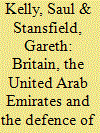|
|
|
Sort Order |
|
|
|
Items / Page
|
|
|
|
|
|
|
| Srl | Item |
| 1 |
ID:
123888


|
|
|
|
|
| Publication |
2013.
|
| Summary/Abstract |
This article investigates the deepening of the UK's security and defence arrangements with the United Arab Emirates (UAE).
In recent years there has been a flurry of diplomatic activity indicating far closer engagement between London and Abu Dhabi. Rather than being an innovative initiative of the Cameron government, the interaction has deeper roots, with this article uncovering the importance of the relatively unknown Defence Cooperation Agreement (DCA) of 1996, signed by the Major government. Furthermore, the UK-UAE defence relationship is shown to have endured beyond the infamous UK withdrawal from 'east of Suez' in 1971.
The current engagement is, however, more intense and potentially far-reaching than it had been in recent decades, with the defence sector being placed at the forefront of UK efforts to bolster the relationship with the oil-rich Gulf emirate.
Using official statements from London and Abu Dhabi, this article suggests that the UK-UAE relationship has always remained intact, although it lost focus following the end of the Major government until the refocusing on the Gulf by the Cameron government. The article concludes with an assessment of the expectations of the UAE, and the strategic drivers underpinning UK policy.
|
|
|
|
|
|
|
|
|
|
|
|
|
|
|
|
| 2 |
ID:
121465


|
|
|
|
|
| Publication |
2013.
|
| Summary/Abstract |
The Silk Letters Conspiracy, or Case, was a plot by a small clique of Indian Pan-Islamists located in Afghanistan, India and the Hijaz to overthrow British rule in India during the First World War. Although British officials at the time were prepared to admit that the conspiracy had been 'organised with some skill', there was a general feeling that it was a rather 'pathetic' and 'ineffectual' affair, and 'crazy in the extreme'. This verdict has been echoed by those who have subsequently considered the plot, if only in passing. But there is more to the Silk Letters Conspiracy than meets the eye, as this article will detail. In retrospect, the Case has a greater significance than previously thought in terms of Britain's encounter with Pan-Islam.
|
|
|
|
|
|
|
|
|
|
|
|
|
|
|
|
| 3 |
ID:
134512


|
|
|
|
|
| Summary/Abstract |
Middle Eastern Studies Vol.50, No.6; Nov.2014: p.1006-1026
|
|
|
|
|
|
|
|
|
|
|
|
|
|
|
|
| 4 |
ID:
185811


|
|
|
|
|
| Summary/Abstract |
It is not often that one comes across a former British intelligence chief venting his spleen in public about past injuries done to him by his government and, in doing so, revealing recent intelligence operations. One such instructive example is that of Major-General Sir Wilfrid Malleson who, on 24 January 1922, in a lecture to the Central Asian Society, castigated the British government of India for failing to recognise the admittedly impressive services of the personnel of the British military mission to Turkestan from 1918-20, which had been under his command. In his righteous fury, Malleson revealed to a large extent British military and intelligence operations in the region, particularly as they affected Afghanistan in the critical years of 1919-20, covering as they did the Third Afghan War and its aftermath. It is proposed in this article to concentrate on an examination of this subject since it has been comparatively neglected and has much to tell us about the nature of British intelligence in this period and place.
|
|
|
|
|
|
|
|
|
|
|
|
|
|
|
|
| 5 |
ID:
185809


|
|
|
|
|
| Summary/Abstract |
This special issue is dedicated to the memory of Sylvia Kedourie, who maintained her editorship of this journal from 1992-2016. Of course, she had been closely involved with the journal since its foundation by her husband, Elie, in 1964. Yet, following his premature death in 1992, she continued the editorship, aided by her daughter, Helen, who continues the Kedourie connection with the journal to this day. As most of the contributors to this special issue can testify, Sylvia was very much a hands-on editor. She read all the submitted articles and edited and proofed those that were accepted for publication. She continued to do this right till the end of her long life. She was, rightly, insistent that the highest standard of scholarship should always be maintained by the journal. She kept in touch with her contributors, often welcoming them to her London home in Lawn Road. She was keen to encourage younger scholars to publish with the journal and even invited some of them to join the editorial board. She took a personal interest in them and was always ready to give advice when it was required. She had an infectious sense of humour and would delight in telling a joke, always accompanied by a chuckle. After being fed with sandwiches and coffee, one always came away from Lawn Road with an armful of books to review, pulled from the tottering towers of paper and publishers’ volumes in her library. Literally, she lived for the journal.
|
|
|
|
|
|
|
|
|
|
|
|
|
|
|
|
|
|
|
|
|